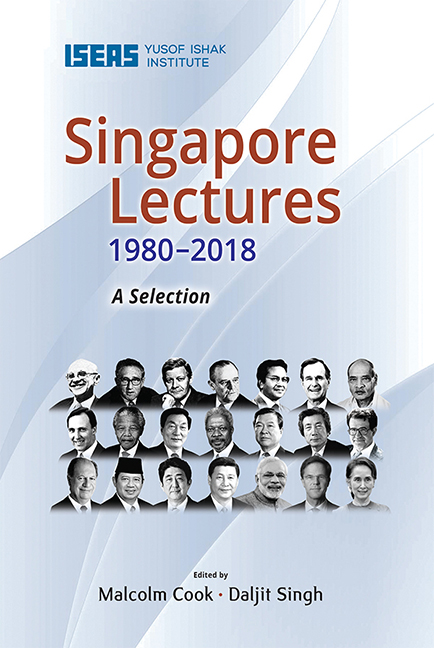Book contents
- Frontmatter
- Contents
- Introduction
- 1 The Invisible Hand in Economics and Politics
- 2 American Foreign Policy: A Global View
- 3 The Soviet Union: Challenges and Responses as Seen from the European Point of View
- 4 Trends in the International Financial System
- 5 Regionalism, Globalism and Spheres of Influence: ASEAN and the Challenge of Change into the 21st Century
- 6 US Policy in the Asia-Pacific Region: Meeting the Challenges of the Post-Cold War Era
- 7 India and the Asia-Pacific: Forging a New Relationship
- 8 Australia, Asia and the New Regionalism
- 9 South and Southern Africa into the Next Century
- 10 China and Asia in the New Century
- 11 Global Values: The United Nations and the Rule of Law in the 21st Century
- 12 Peace on the Korean Peninsula and East Asia
- 13 Japan and ASEAN in East Asia: A Sincere and Open Partnership
- 14 EU and Asia: Sharing Diversity in an Inter-regional Partnership
- 15 Global Challenges in the 21st Century: A View from Chile
- 16 Indonesia: The Challenge of Change
- 17 Japan and ASEAN, Always in Tandem: Towards a More Advantageous Win-Win Relationship through My “Three Arrows”
- 18 Forging a Strong Partnership to Enhance Prosperity of Asia
- 19 India’s Singapore Story
- 20 The Netherlands, Singapore, Our Regions, Our World: Connecting Our Common Future
- 21 Democratic Transition in Myanmar: Challenges and the Way Forward
- The Singapore Lecture Series
- The Editors
13 - Japan and ASEAN in East Asia: A Sincere and Open Partnership
Published online by Cambridge University Press: 09 October 2021
- Frontmatter
- Contents
- Introduction
- 1 The Invisible Hand in Economics and Politics
- 2 American Foreign Policy: A Global View
- 3 The Soviet Union: Challenges and Responses as Seen from the European Point of View
- 4 Trends in the International Financial System
- 5 Regionalism, Globalism and Spheres of Influence: ASEAN and the Challenge of Change into the 21st Century
- 6 US Policy in the Asia-Pacific Region: Meeting the Challenges of the Post-Cold War Era
- 7 India and the Asia-Pacific: Forging a New Relationship
- 8 Australia, Asia and the New Regionalism
- 9 South and Southern Africa into the Next Century
- 10 China and Asia in the New Century
- 11 Global Values: The United Nations and the Rule of Law in the 21st Century
- 12 Peace on the Korean Peninsula and East Asia
- 13 Japan and ASEAN in East Asia: A Sincere and Open Partnership
- 14 EU and Asia: Sharing Diversity in an Inter-regional Partnership
- 15 Global Challenges in the 21st Century: A View from Chile
- 16 Indonesia: The Challenge of Change
- 17 Japan and ASEAN, Always in Tandem: Towards a More Advantageous Win-Win Relationship through My “Three Arrows”
- 18 Forging a Strong Partnership to Enhance Prosperity of Asia
- 19 India’s Singapore Story
- 20 The Netherlands, Singapore, Our Regions, Our World: Connecting Our Common Future
- 21 Democratic Transition in Myanmar: Challenges and the Way Forward
- The Singapore Lecture Series
- The Editors
Summary
On 14 January 2002, Prime Minister of Japan Junichiro Koizumi gave the 20th Singapore Lecture after being welcomed by Deputy Prime Minister Tony Tan. Prime Minister Koizumi was the second Japanese prime minister to give a Singapore lecture following Prime Minister Ryutaro Hashimoto who gave the 15th Singapore Lecture in 1997. Prime Minister Koizumi's lecture stands out for three reasons: his focus on Japan's relations with ASEAN, a clear set of policy recommendations for future Japan-ASEAN cooperation, and his argument that the Japan-ASEAN relationship should be the platform for a wider East Asian community. This speech is a clear enunciation of the idea of ASEAN centrality in East Asia.
Your Excellency, Prime Minister Goh Chok Tong, Your Excellency, Deputy Prime Minister and Minister for Defence Tony Tan, Ladies and Gentlemen.
I am greatly honoured to give this speech here in Singapore, the final stop on my schedule of visits to the countries of ASEAN.
Singapore is a remarkable nation with remarkable people. Bursting through the constraints of size and resources, Singapore through sheer energy and willpower has created a tremendous place for itself in the world. Through its economic and diplomatic vitality, it contributes to the international community far in excess of what size alone would warrant. And so to the government and people of Singapore, let me express my admiration and respect for your achievements.
I am told that Singapore is called the “Lion City”. Maybe it has something to do with my hairstyle, but in Japan I am known as the “Lion Prime Minister”. Perhaps that is why I am so delighted to be here in the Lion City.
Today I would like to speak about co-operation between Japan and ASEAN and my concept of how this co-operation can contribute to all of East Asia.
Let me begin by defining what co-operation truly is. Co-operation is working in common purpose with others in order to accomplish more. In the simplest terms, this is what I would like to see Japan and ASEAN accomplish—more prosperity, more peace, more understanding, more trust. This co-operation requires an exchange of ideas, opinions and people.
- Type
- Chapter
- Information
- Singapore Lectures 1980-2018 , pp. 210 - 216Publisher: ISEAS–Yusof Ishak InstitutePrint publication year: 2020



